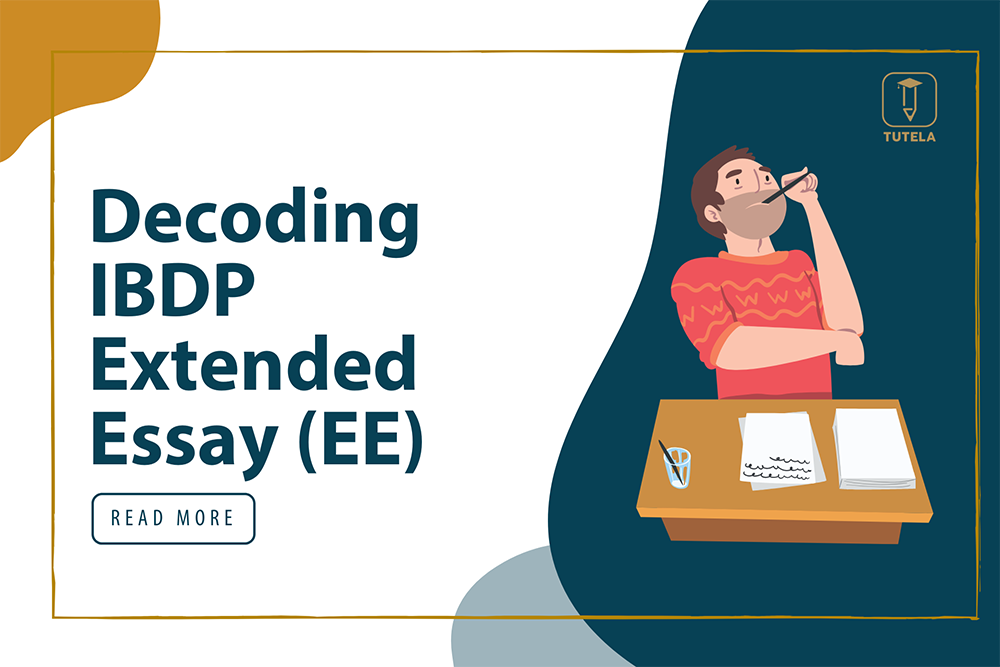
The IB Diploma Programme (IBDP) curriculum comprises six subject groups and the DP core. The core components are-
Theory of knowledge
The extended essay
A project related to concepts of CAS: creativity, activity, and service.
Extended Essays (EEs)
Extended Essay is one of the essential components of the International Baccalaureate Diploma Programme (IBDP) core and is written in grade 11. The EEs are mandatory in nature for all IBDP students.
EEs are a self-directed piece of research carried out independently, culminating with a 4000-word paper. The International Baccalaureate (IB) sets a submission date for the extended essay, which is communicated to schools.
It is each school’s responsibility to ensure that all candidate work is received by the IB, with the required paperwork received by the submission date set. Furthermore, the schools can set internal deadlines for different stages of producing the EE until final submission with the IB.
Following are a few of the topics covered by the students during their EEs.
• “An analysis of costume as a source for understanding the inner life of the character”
• “A study of malnourished children in Indonesia and the extent of their recovery after a period of supervised improved nutrition.”
• “Doing versus being: language and reality in the Mimamsa school of Indian philosophy.”
• “The effects of sugar-free chewing gum on the pH of saliva in the mouth after a meal.”
• “To what extent has the fall in the exchange rate of the US dollar affected the tourism industry in Carmel, California?”
• “What level of data compression in music files is acceptable to the human ear?”
Some of the Sample EE topics available on the official website of IB are-
• What is the relationship between the length of an exhaust pipe and the frequency of the sound it emits?
• How far was the Christian Democrat victory in the Italian elections of 1948 influenced by Cold War tensions?
• How effective is Friedrich Dürrenmatt’s use of colour to convey his message in the play Der Besuch der Alten Dame?
Significance of EEs
1. Proactive Approach– EEs inherit a practical approach in you by proactively involving you in writing EEs. Doing so, helps you prepare yourself for the research part that you’ll have to carry out in your undergraduate.
2. Self-exploration– Through EEs, IB sows a seed inside every student which enables them to think from a broader perspective. Rote learners will never be able to fit in IBDP as EE demands out-of-the-box thinking, critical thinking, and active learning.
3. Ideation– The research part allows you to come up with ideas. Not only ideating but also communicating those ideas and putting them across in your research.
4. Self-management– EEs help in developing thinking, research, time and self-management skills, and communication skills in every student.
5. Global consciousness– EE can be undertaken in World Studies, in which the EE must focus on a topic of global significance. Researching topics of global significance educates students on global issues prevalent in the world. This gives an insight into what the world is dealing with currently. Some examples of global issues are- the global food crisis, climate change, terrorism, energy security, migration, global health, technology, and cultural exchange.
The extended essay process
STEP 1: The research process
• Choose the approved DP subject.
• Choose a topic.
• Undertake some preparatory reading.
• Formulate a well-focused research question.
• Plan the research and writing process.
• Plan a structure (outline headings) for the essay. This may change as the research develops.
• Carry out the research.
STEP 2: Writing and formally presenting the EE
The required elements of the final work to be submitted are as follows.
• Title page
• Contents page
• Introduction
• Body of the essay
• Conclusion
• References and bibliography
The upper limit of 4,000 words includes the introduction, body, conclusion, and bibliography.
Tips to Ace your EEs
• Choosing the right EE subject/field -Try doing the EE on the subject you’re performing well in. Just being interested in a particular subject will not suffice for the purpose. You need something more than just being interested and that is a passion then only you’ll be able to write better. Furthermore, provide a logical and coherent rationale for your choice of topic. We also provide assistance with EEs so if you need any assistance with choosing the right EE for you then feel free to contact us.
• Do not procrastinate in doing your EE, whatever little information you gather make sure you save it somewhere so that you don’t lose it. Do thorough research in order to have authentic content. Do not entirely rely on any source you find on the internet.
• Review what has already been written about the topic.
• Formulate a clear research question. Offer a concrete description of the methods used to investigate the question and generate reasoned interpretations and conclusions based on your reading and independent research in order to answer the question.
• Reflect on what you learned throughout the research and writing process.
• Take constant feedback from your supervisor/counsellor on your EEs and improvise accordingly.
• Do not resort to plagiarism. Keep it as authentic and real as you can as plagiarism will downgrade the quality of your EE and won’t help you score better.
• Do sample EE online. Resources to find EE topics- Follett offers a plethora of resources that can help you in IBDP. These essays fulfil the requirements for an ‘A’ grade in the extended essay.
Have any queries regarding the IBDP curriculum? Check our FAQ section to get your queries resolved.
Fill out Tutela’s student assistance form or call us directly at +91-8826345541 for any further queries.